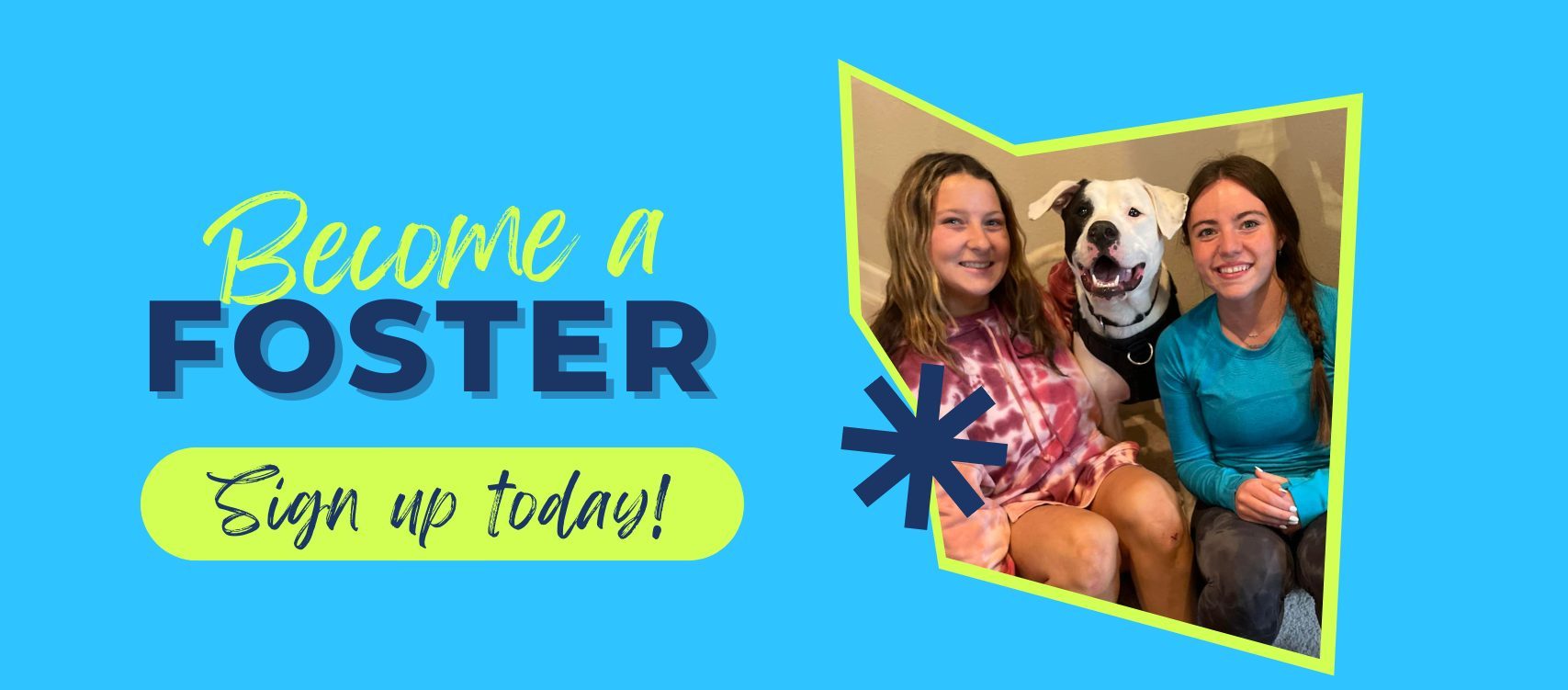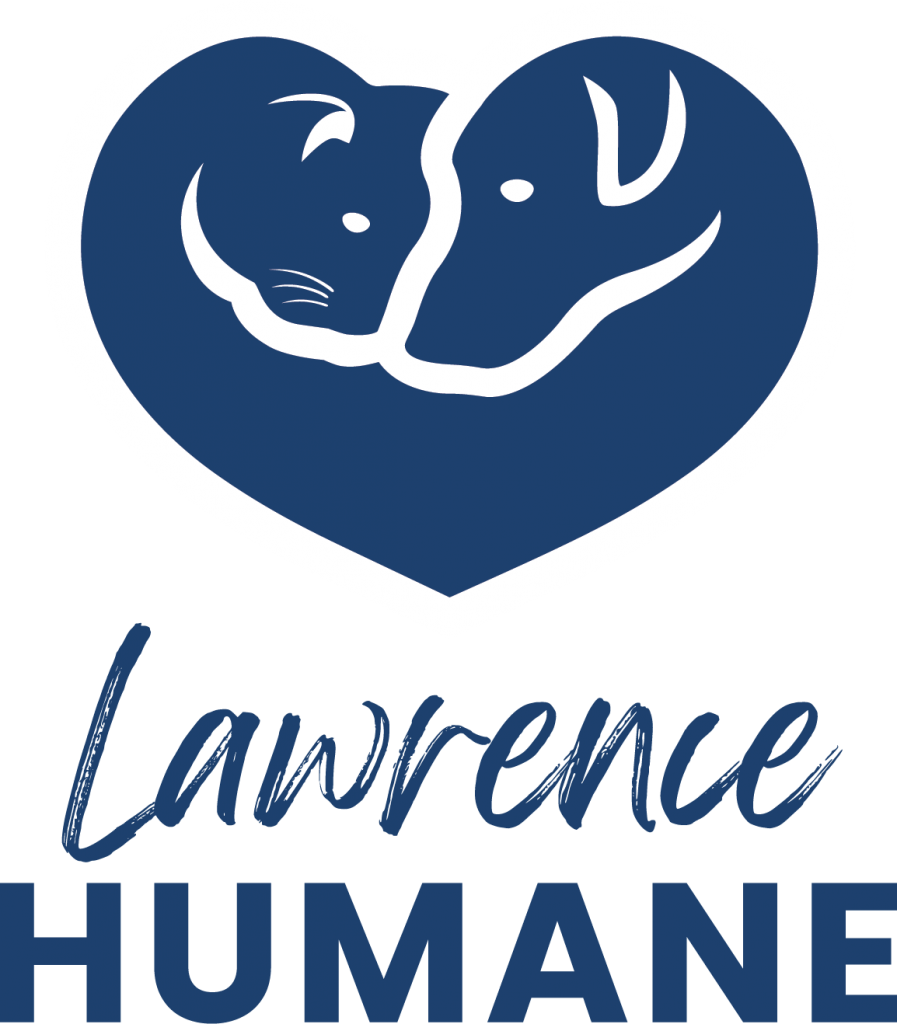Sometimes, the greatest gift you can give to a shelter pet is time, love, and a temporary place to call home.
If you’re looking for a rewarding way to make a difference in the lives of pets in need — and you have a little extra room in your home and love in your heart — consider becoming a foster parent!
Lawrence Humane foster parents provide temporary care to animals that need a little rest and relaxation from the shelter, are not yet ready for adoption because they are recovering from injury or illness, or are too young to be adopted.

Lawrence Humane provides all the food, supplies, kennels, toys, treats, and support a foster needs! We are here to help you with whatever support you need to care for the animal.
It completely depends on the animal and the situation. The average stay in a foster home is about 2-3 months for adult animals. Younger animals tend to get adopted at a higher rate and are generally a shorter commitment.
Although we take great care of all the animals that come through our doors, often times it is best for an animal to be sent to foster care. Click here to learn about some of those reasons!
Yes! Our team will make sure that the animal is a good fit in your home. We will provide you with instructions on how to safely introduce and integrate the animals and are always here for additional support.
YES! Foster parents and friends of fosters have first choice to adopt their foster animal. However, if the animal has an agreed upon upcoming potential adoption meet, we ask that you honor the meet.
We prefer that foster parents continue to foster until we find a permanent home for their foster animal. It’s extremely stressful for an animal to be returned to the shelter environment. We request that a foster parent provides as much notice as possible so that we can find an alternative foster home to transfer the animal to. Of course, in an emergency a foster parent may always bring their animal back to the shelter.
If given enough notice, we can usually find volunteers or another foster that can care for the other animal for short durations. We ask that foster parents always keep the foster coordinator aware of any temporary foster sitting situations.
First and foremost is marketing! If no one knows about your foster animal, or how wonderful they are, then it will be next to impossible to find them a forever home. In addition to supplying great photos and helpful information, you can give a foster animal additional exposure by telling friends and family about them. Creating a social media accounts that features your foster animal also provides them with more exposure to a wide variety of people and helps shelter staff market them appropriately on our channels.
Secondly, our dogs benefit greatly from the exercise (with the exception of those with some medical conditions), basic training, special love and attention you give them. While marketing provides you with applicants, it’s always the dog that “closes the deal.” Providing a foster dog with basic training and manners will increase their adoptability. Shy dogs will benefit from your patience, routine and slowly exposing them to new people to build their confidence. Rambunctious adolescents who learn good manners in their foster home will help show off their trainability and long term potential. And while puppies are adorable, they need a lot of love, attention and hand‐holding from humans to develop properly and feel secure.
Don’t worry! Fostering is just one of the many ways that you can get involved and help save lives. You could try volunteering. You can also donate money or supplies from our wish list, such as food, treats, cat litter, toys, and other goods that help us to provide the best care for pets in the shelter. Sharing our adoptable pets on your social media channels can also help us to find homes for animals while helping to educate people on the importance of adoption. However you chose to help, we appreciate your support!
Absolutely! Just because your foster gets adopted doesn’t mean you must have another in your home right away. It’s up to you when you want to bring another animal into your home!
To an extent – yes! We send out regular emails featuring which animals need out of the shelter most. All you have to do is reply and say you’d like to foster the animal “XYZ” and how long you can foster for! Although it is ideal for a foster animal to be cared for in a home until it is adopted, we are happy for an animal to be in a foster home for any length of time!
Have other questions? Email our foster team at foster@lawrencehumane.org!

Other resources we love!

Need access to the Trello board? Click here!
Have you joined our Facebook group?
Other resources we love!

From preparing for your foster kitten to bottle feeding and routine care, learn everything you need to know to be a hero for the tiniest felines from Hannah Shaw – aka the Kitten Lady! Hannah and her team offer a robust catalog of instructional videos and more. If you have a question about fostering kittens, this is the place to go!
Our behavior team is a great wealth of knowledge and are happy to help work through any behaviors your foster animal might be exhibiting. This video highlights a few basics of teaching new behaviors. It’s perfect for training dogs using positive reinforcement and includes tips to help you avoid common pitfalls in training.

Marketing your foster pet is crucial to helping find its forever home! And taking great photos is #1 for getting them noticed. It can be hard to grab great pictures of your foster pet but check out this blog for a few tips to get those photos in tip-top shape!

Dogs
- Shelter Stress
- Despite our many efforts to create a safe and enriching place for animals, the shelter is a stressful place for the animals in our care. When we send out emails asking for fosters, these dogs are in most urgent need of foster care and would benefit greatly from getting out of the shelter.
- Medical Needs
- Occasionally we have a dog recovering from an injury, recovering from surgery, or needing foster care while our medical team works to diagnose and treat an ongoing medical issue. If you have other pets in the home, you can still foster dogs who have medical needs. Our foster team will provide additional support and resources to ensure everyone in the home stays happy and healthy!
- Crisis Pet Retention (CPR)
- The Crisis Pet Retention program helps keep animals with their owners while they’re experiencing a crisis. If we have the capacity or a foster home to send the animals to, we assist in temporarily boarding animals while their owner gets the help they need. CPR animals are here for 3-6 months on average. Scroll down to learn more about fostering a CPR animal!
Puppies
- Bottle Babies
- If puppies are under 5 weeks old and without their mother, they typically need bottle fed. When they’re first born, they need fed every two hours including overnight. As time goes on, the length of time between feedings grow.
- Nursing Puppies
- We often get nursing mothers in with their puppies. In this case, the mother AND the puppies all need to remain in foster care until the puppies are 8 weeks old and we can spay/neuter them.
- Underage
- Puppies ages 5-8 weeks are typically weaned and eating on their own but are still too young for us to spay/neuter. These puppies go to foster care until they’re 8 weeks old.
Cats
- Shelter Stress/Socialization
- Stressed cats we advertise for foster care are typically ones that have stopped eating and/or drinking, or have gotten so stressed out that they’ve become uncomfortable and untrusting of human interaction. Often, we see a huge difference in the animal’s behavior once it is in a home setting. It is hugely beneficial for us to see how cats interact in a home setting so we can make a great match with potential adopter.
- Other Medical Needs
- Other medical issues that frequently benefit from foster care include upper respiratory infections, calicivirus, hyperthyroidism, stomatitis, ringworm, and diabetes. If you have other pets in the home, you can still foster cats who have medical needs. Our foster team will provide additional support and resources to ensure everyone in the home stays happy and healthy!
- Crisis Pet Retention (CPR)
- The Crisis Pet Retention program helps prevent animals from being surrendered to the shelter and stay with their owners while they’re experiencing a crisis. If we have the capacity or a foster home to send the animals to, we assist in temporarily boarding animals while their owners gets the help they need. CPR animals are here for 3-6 months on average. Scroll down to learn more about fostering a CPR animal!
Kittens
- Bottle Babies
- If kittens are under 5 weeks old and without their mother, they typically need bottle fed. When they’re first born, they need fed every two hours including overnight. As time goes on, the length of time between feedings grow.
- Nursing Kittens
- We often get nursing mothers in with their kittens. In this case, the mother and kittens remain together until the kittens have weaned. Mom can then come back to the shelter while the kittens remain in foster care until they’re eight weeks old AND two pounds.
- Underage/Underweight
- We do not spay/neuter kittens until they are over eight weeks old AND weigh over two pounds. If kittens are weaned (eating on their own) but still underweight or underage, they are sent into foster care.
- Socialization
- Socialization can be part of fostering underage/underweight kittens as well. We often get kittens in that have lived outside as part of a feral cat colony and will likely make great house pets with proper socialization. When they’re under twelve weeks old, they’re still at an age where they can be socialized and adopted as house pets. These are kittens that may hide or hiss initially.
Crisis Pet Retention (CPR) Program
Lawrence Humane’s Crisis Pet Retention Program provides resources to pet owners experiencing crises relating to poverty, houselessness, job loss, or other systemic issues and inequities. The goal of the program is to proactively ensure that Douglas County residents do not suffer through giving up a family pet because of financial hardship. We understand financial circumstances alone are not reliable indicators of the capacity to love and care for a pet.
Over the years, our data shows that pet owners would choose to keep their pet if they were provided short-term help. That’s where the CPR program comes in. The Lawrence Humane Society recognizes the importance of the bond people have with their pets and works to keep pets and people together.
Lawrence Humane Society provides the following types of assistance:
- Pet deposits/pet rent
- Essential pet supplies including food, crates, collars, and flea/tick preventative
- Emergency veterinary care
- Behavior consulting
- Temporary boarding (this is where foster families can help!)
- Wellness medical care including spay/neuter surgeries and vaccinations
- Connection to other supportive human services and resources
Anyone requesting CPR assistance must fill out an application. Lawrence Humane’s social worker follows up requests for temporary boarding to learn more about the situation and determine if we can help. We won’t board someone’s pet so they can go on vacation, but we will often help the pet owner who needs to seek medical care, enter into a treatment program, seek safety with a domestic violence shelter, or need to find housing. Once approved, the pet owner enters into a signed agreement with the shelter to reclaim the animal by a specified date. Next, we receive the animal and make sure it is up-to-date on vaccines and all medical needs are addressed, and then we seek foster care placement for the animal.
The length of time an animal needs foster care varies. Some individuals need only a few days to resolve their situation, and others need a month or more. It can often take 3 or more months for individuals to secure housing when working with one of the local social service agencies. For longer term situations we typically enter into an agreement to house and care for the animal for 1 month and require the owner to check in if they need more time so we can discuss the status of their case. We follow a similar philosophy to other social service agencies and make a good faith effort to work with individuals who are actively working toward a resolution for their situation but need more time.
In the day-to-day, fostering for the CPR Program is like any other type of fostering. The care and love you give is the same. The way it differs is that the animal is owned and not eligible for adoption. This means if you fall in love, you aren’t able to adopt the animal.
If helping people and pets in crisis is particularly meaningful to you, then you might be perfect for this special type of fostering. The right person to foster for the CPR program is someone who understands the animal may not come from perfect circumstances and may not be returned to perfect circumstances but with CPR assistance we can help preserve the pet-owner relationship while the pet owner works to stabilize or resolve their crisis.
Yes, sometimes after entering into the program the owner determines they are no longer able to care for their pet, or their situation becomes more dire and they do not return for the animal. Over 75% of animals in the CPR boarding program are reunited with their owners. For each animal in the program, we have a signed agreement that requires the owner to stay in communication with our social worker and establishes an agreed pickup time. This ensures if the owner fails to return for their pet that the animal can ultimately be adopted out to a new family.
Please make sure you’ve submitted a Foster Application (listed above) and email our foster coordinator at foster@lawrencehumane.org to let them know you’re interested in fostering a CPR animal!



